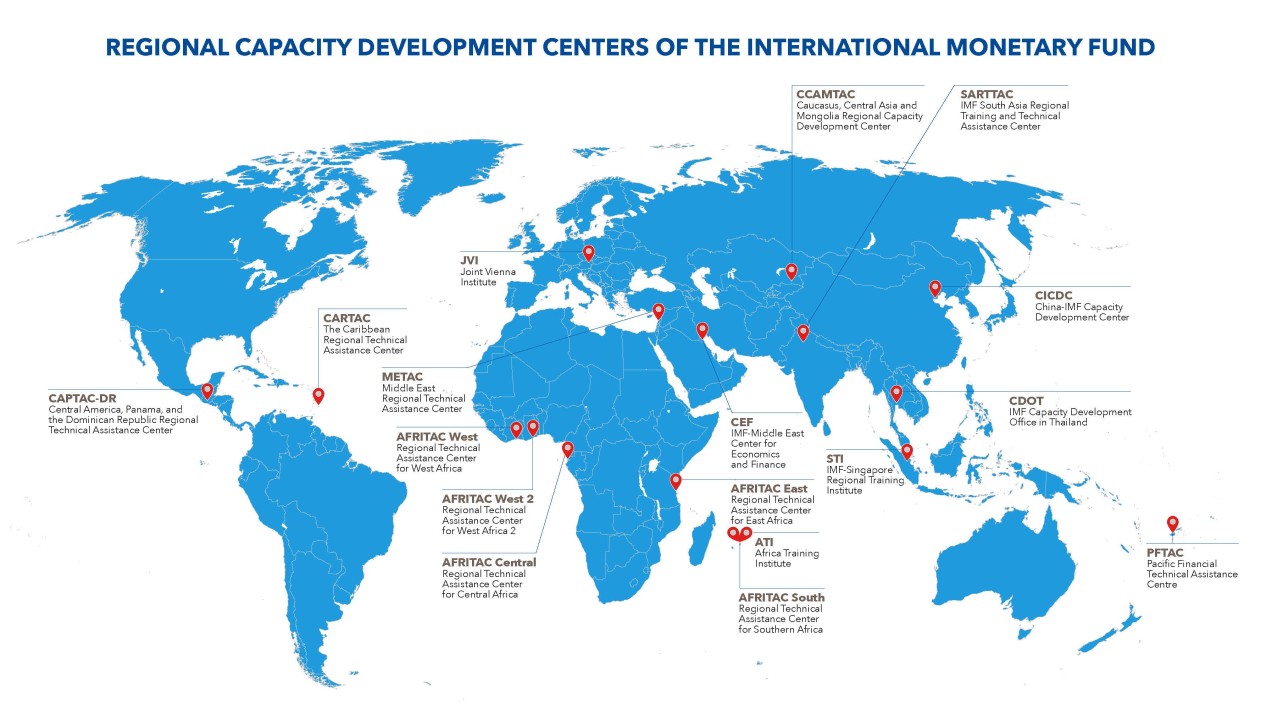
The IMF’s global network of regional centers at the forefront of the pandemic response
The International Monetary Fund leverages a network of seventeen regional capacity development centers (RCDCs) spread across five continents to help meet its members’ needs for technical assistance and training. The latest center officially opened on February 1st, 2021, and covers the Caucasus, Central Asia, and Mongolia region. Overall, more than eight hundred IMF staff members work outside the main headquarters in Washington, DC. The IMF's development partners and host countries fund a significant share of costs related to these centers.
Together with resident representatives and advisors, RCDC staff can quickly respond to requests from centers’ member countries with tailored capacity development. Through their local and long-term presence, IMF staff develop the necessary relations of trust with local authorities that are not only necessary to implement long-term reforms, but also needed to adapt to urgent needs swiftly.
RCDCs were therefore able to offer an agile support to countries amidst COVID-19, and the pre-existing working relationships facilitated the delivery of technical assistance and training through virtual and hybrid engagements. IMF capacity development remained robust during the pandemic crisis, and the integration with surveillance was further increased.
At a 2021 retreat of RCDC directors (November 9-11), IMF’s First Deputy Managing Director Geoffrey W.S. Okamoto stressed that surveillance and capacity development serve complementary and mutually reinforcing roles. By identifying economic and financial risks and opportunities, surveillance helps build the capacity development agenda, which in turn enhances the focus and specificity of policy advice. Mr. Okamoto also said that RCDCs are well placed to address cross-cutting issues such as climate, gender, and fragility.
In her Tuesday morning address, IMF Deputy Managing Director Antoinette M. Sayeh highlighted the significance of the COVID-19-related assistance delivered by RCDCs, from setting up fiscal transparency portals on COVID-19 spending and debt management to boosting revenue mobilization and better tracking economic activity. She stressed that “the IMF’s regional centers have been at the forefront of the IMF’s capacity development efforts during the crisis.”
Other sessions discussed how RCDCs can further support the IMF’s new or enhanced policy priorities, with a particular focus on gender, climate, digital money, and fragile and conflict-affected states. RCDC directors confirmed that capacity development beneficiaries and development partners are all pushing in the same direction.
Gerry Rice, Director of the IMF’s Communications Department, stressed in a Wednesday morning presentation that RCDCs have a key role to play in ensuring that on-the-ground policies match the top line priorities, thereby effectively supporting the IMF’s people-centered approach to the pandemic response and recovery.
Several IMF partners – which fund over half of the IMF’s capacity development work – also joined the retreat. They contributed to the important discussions around the IMF’s focus on domestic revenue mobilization, public debt management, climate, and digitalization, among other topics.
Useful links:






Sr Operations Officer at The World Bank Group (DAIS)
2yPaolo Dudine
Principal Technical Adviser for UNCDF
2yThanks for sharing